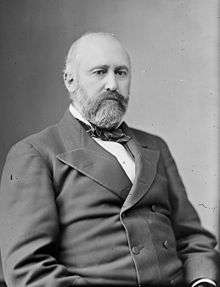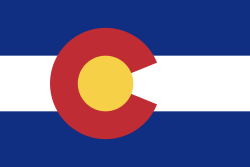Jerome B. Chaffee
Jerome Bunty Chaffee (April 17, 1825 – March 9, 1886) was an American entrepreneur and United States Senator from Colorado. Chaffee County, Colorado[1] is named after him.
Jerome B. Chaffee | |
|---|---|
 | |
| United States senator from Colorado | |
| In office November 15, 1876 – March 3, 1879 | |
| Preceded by | None |
| Succeeded by | Nathaniel P. Hill |
| Delegate to the U.S. House of Representatives from Colorado Territory's At-large district | |
| In office March 4, 1871 – March 3, 1875 | |
| Preceded by | Allen A. Bradford |
| Succeeded by | Thomas M. Patterson |
| Personal details | |
| Born | April 17, 1825 Niagara County, New York |
| Died | March 9, 1886 (aged 60) North Salem, New York |
| Resting place | Oakwood Cemetery, Adrian, Michigan |
| Political party | Republican |
Biography
He was born in Cambria, New York. He moved to Adrian, Michigan in 1844 and worked as a teacher until starting a dry goods business in the late 1840s. In 1852 he moved to St. Joseph, Missouri, and later to Elmwood, Kansas Territory where he started banking businesses and engaged in land speculation.
In 1860 he moved to Colorado to invest in mining. He was one of the founders of the City of Denver, Colorado, and founded the First National Bank of Denver in 1865. Chaffee entered politics and helped organize the Colorado Territory, serving in its first legislature as speaker. He was the territorial delegate to the United States Congress starting in 1870.
In 1876, after Colorado was admitted to the Union, Chaffee was elected to the United States Senate. He served for the duration of his term, until 1879, but did not seek reelection due to poor health.
In 1884, Chaffee was elected state chairman of the Colorado Republican Party.
His sole surviving child, daughter Fannie Josephine (1857–1909), married Ulysses S. Grant, Jr., a son of U.S. President Ulysses S. Grant.
Chaffee died March 9, 1886, at the Grants' home in Salem Center, New York. He is buried in Adrian Cemetery, in Adrian, Michigan.[2]
Notes
- Gannett, Henry (1905). The Origin of Certain Place Names in the United States. Govt. Print. Off. pp. 74.
- Biographical Directory of the United States Congress
References
- Biographical Directory of the United States Congress: Chaffee, Jerome Bunty, accessed 9 December 2005
- The National Cyclopædia of American Biography. (1929) Vol. VI New York: James T. White & Co. pp. 199–200.
- Who was Who in America, Historical Volume. (1963) Chicago: Marquis Who's Who
| U.S. House of Representatives | ||
|---|---|---|
| Preceded by Allen Alexander Bradford |
Delegate to the U.S. House of Representatives from Colorado Territory 1871–1875 |
Succeeded by Thomas MacDonald Patterson |
| U.S. Senate | ||
| Preceded by none |
U.S. senator (Class 3) from Colorado 1876–1879 Served alongside: Henry M. Teller |
Succeeded by Nathaniel P. Hill |


